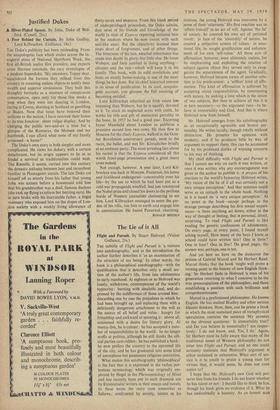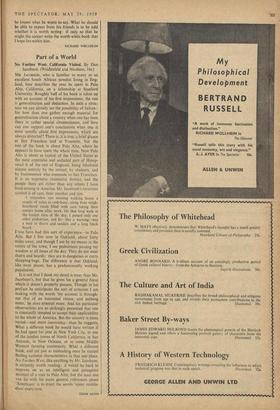The Lie of it All
THE subtitle of Flight and Pursuit is 'a venture into autobiography,' and in the introduction the author further describes it 'as an examination of the structure of my being.' In other words, the book is a philosophical autobiography—with the qualification that it describes only a small sec- tion of the author's life, from late adolescence to early manhood. At eighteen or so Holroyd was lonely, withdrawn, contemptuous of the world's hypocrisy : burning with idealistic zeal, and de- pressed by the indifference of those around him : discarding one by one the prejudices in which he had been brought up, and replacing them with a deliciously dangerous attachment to the will as the source of all belief and value: hungry for friendship and awkward at securing it : above all, consumed with a desire for literary glory. At twenty-five, he is calmer: he has accepted a num- ber of responsibilities to the world : he no longer scoffs at politics, although he still thinks the offi- cial parties cant-ridden : he has published a book : he now prefers the country to the uprooted life of the city, and he has graduated into some kind of amorphous but passionate religious conviction.
What makes this autobiography 'philosophical' is the fact that it is expressed in the rather por- tentous terminology which was originally em- ployed by Hegel in the Phenomenology of Mind and has recently been put to such dramatic use by Existentialist writers in their essays and novels. In these terms the story runs somewhat as follows: confronted by society, nature or his mistress, the young Holroyd was overcome by a sense of their 'otherness.' His first reaction was to 'affirm himself' in an act of will. Against 'the lie' of society, he asserted his (Aim act of personal revolt : in face of the 'absurdity' of nature, he created a subjective system of values : in emo- tional life, he sought gratification and enhance- ment of his own 'self-value.' All these acts of affirmation, however, were ultimately useless, for by emphasising and exploiting the relation of subject against object they served only to exag- gerate the separateness of the agent. Gradually, however, Holroyd became aware of another solu- tion to his predicament : a 'selfless' kind of affir- mation. This kind of affirmation is achieved by accepting social responsibilities, by communing with nature, by seeking a love which is the union of two subjects. But then to achieve all this it is in turn necessary—so the argument runs—to be- lieve in immortality and God. And this is where Holroyd now finds himself.
Mr. Holroyd emerges from his autobiography as an exceptionally agreeable and honest per- sonality. He writes lucidly, though totally without distinction. He presents• his opinions with modesty; and if he produces little by way of argument to support them, this can be accounted for by his professed dislike of winning converts to his way of thinking.
My chief difficulty with Flight and Pursuit is that I cannot see why on earth it was written, or once it was written why any encouragement was given to the author to publish it. A propos of his reaction to the world's hypocrisy Holroyd writes, 'My vision of the lie of it all was certainly not a very unique perception.' And that sentence could serve as an epitaph to the whole book. Nothing in it is based on 'a very unique perception.' At no point in the book—except perhaps in the strange passage describing his first sexual experi- ences—is there anything set down, either in the way of thought or feeling, that is personal, direct, surprising. To read Flight and Pursuit is like reading the generic confessions of adolescence. On every page, at every point, I found myself asking myself, How many of the boys I knew at school could have written this? One in three? One in four? One in five? On good pages, the answer was, perhaps, one in ten.
And yet here we have on the dustcover the praises of Gabriel Marcel and Sir Herbert Read. Marcel thinks that the book 'might well prove a turning point in the history of new English think- ing.' Sir Herbert finds in Holroyd 'a man of his generation returning to what I conceive to be the true preoccupations of the philosopher, and there establishing a position with such brilliance and comprehensiveness.'
Marcel is a professional philosopher. He knows English. He has studied Bradley and other serious Idealist thinkers. How, then, can he praise a book in which the most sustained piece of metaphysical speculation contains the sentence 'My answers to the obvious questions: Is immortality true? and Do you believe in immortality? are respec- tively: I .do not know, and, Yes, I do.' Again, Sir Herbert must be fully aware that many of the traditional issues of Western philosophy do not enter into Flight and Pursuit, and no one could seriously maintain that Holroyd's argument is either sustained or exhaustive. What sort of ser- vice is it to youth to praise a young man for virtues that, it would seem, he does not even ,aspire to?
I hope that Mr. Holroyd's new God will pre- serve him from his friends. I do not know whether he has talent or not : I should like to think he has. though his book gives no evidence of it. What he has undoubtedly is honesty. As an honest man he knows what he wants to say. What he should be able to expect from his friends is to be told whether it is worth saying: if only so that he might the sooner write the worth-while book that I hope lies within him.
RICHARD WOLLHEIM















































 Previous page
Previous page